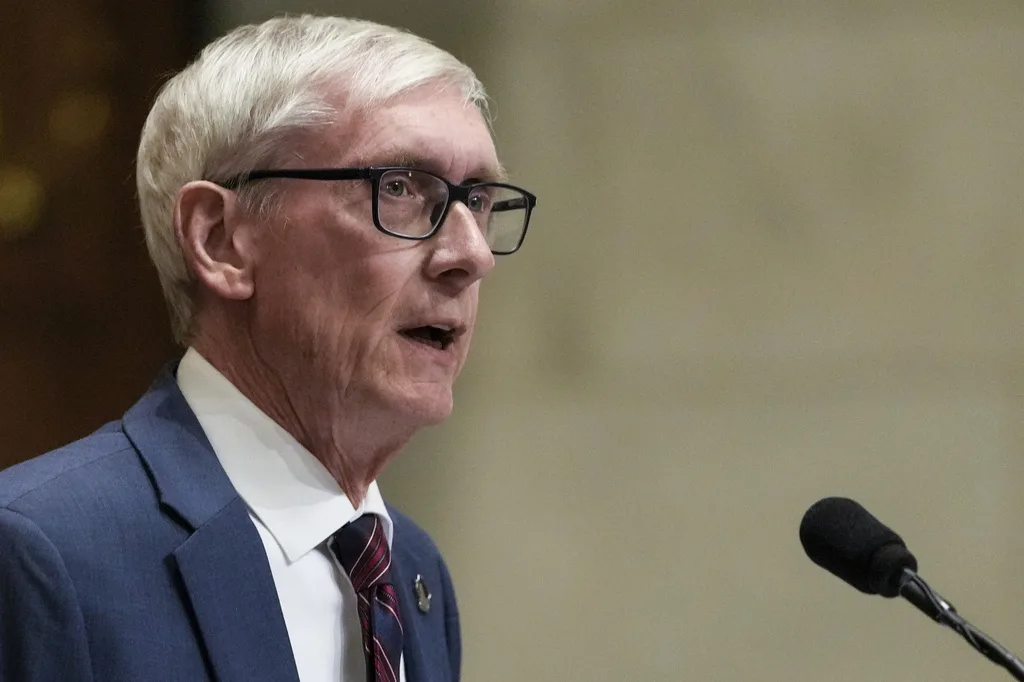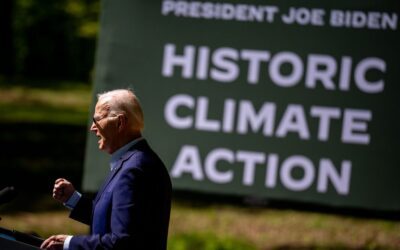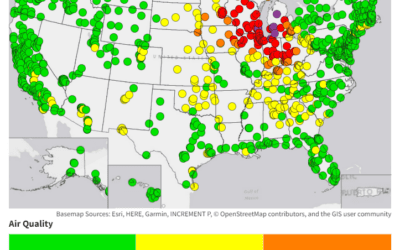
Wisconsin Gov. Tony Evers gives his annual State of the State address Tuesday, Jan. 23, 2024, in Madison, Wis. (AP Photo/Morry Gash)
In recognition of National Groundwater Awareness Week, Gov. Tony Evers visited a series of local water treatment centers last week. The site visits came amid Evers’ continued calls for state Republicans to end their standoff and release $125 million dedicated to reducing the impact of per- and polyfluoroalkyl substances (PFAS) throughout the state. These chemicals are used to make coatings and products that resist heat, stains, oil, and water. PFAS are also associated with severe health risks.
PFAS, also known as “forever chemicals,” are pollutants that are linked to increased risk of some cancers, reproductive health effects, and developmental delays in children. They constitute everything from non-stick cookware and pizza boxes to fire-extinguishing foams. In addition to water contamination, humans might be exposed to PFAS via soil, air, and food—including fish from local waterways and dairy products sourced from animals who have ingested PFAS.
To learn more about the impacts of PFAS in Wisconsin, Evers toured Isle La Plume wastewater treatment plant in La Crosse, Marinette Water Utility in Marinette, Columbus Water Utility, Waterworks Park in Beaver Dam, and a temporary PFAS filtration facility in Marshfield.
These appearances represent Evers’ continuing commitment to addressing PFAS contamination throughout the state, a cause that was initially hopeful after state Republicans approved $125 million in funding to tackle the problem in Wisconsin’s 2023-2025 biennial budget.
Despite initial approval, Republicans have refused to release the funding for more than eight months—a move that Evers says has left him “disheartened.”
“Ensuring access to clean drinking water—including getting PFAS, lead, and other harmful contaminants out of our water—has been a priority of mine since Day One,” the governor said in a statement last year. “Republicans’ continued obstruction of basic government functions is playing politics with our water and peoples’ lives and their livelihoods.”
Evers’ concerns were further raised last month when Republicans passed Senate Bill (SB) 312, which leaves communities impacted by PFAS contamination without immediate financial resources. Instead, communities would utilize a series of more drawn-out grant programs to allocate PFAS funding among municipal water treatment facilities and private land or well owners.
SB 312 allows companies that produce PFAS and other pollutants to avoid legal consequences from the Wisconsin Department of Natural Resources, if the company allows the DNR to partake in on-site cleanup efforts at the department’s own expense. Critics have called this a “poison pill” provision, arguing that it would allow polluters to release hazardous substances without the threat of legal action and undermine Wisconsin’s longtime “spills law” while funding cleanups with taxpayer dollars.
In response to SB 312, Evers doubled down on efforts to reach common ground with Republicans and obtain the promised $125 million in PFAS funding.
Last month, he announced a “compromise proposal” that would allow passage of SB 312, so long as its “poison pill” provisions were removed and the approved funding to combat PFAS were released. The rest of the bill’s provisions would remain largely unchanged.
“Wisconsinites shouldn’t have to wait any longer than they already have,” Evers said in a press release. “I’m urging lawmakers to support this bipartisan compromise that’s mostly based on the bill Republicans passed last week and release these funds so we can get these resources out to communities and folks across Wisconsin who need them.”
Even should Evers ultimately veto SB 312, the approved $125 million in budget funding for PFAS solutions would still sit in wait. Control of funding is under the purview of Wisconsin’s Republican-led Joint Finance Committee (JFC), which could vote to release the money at any time.
The legislative delays come as new Public Health Madison & Dane County test results indicate a rise in PFAS levels in some of Dane County’s private wells. Wisconsinites can track PFAS contamination in their own neighborhoods using an interactive data viewer from the Wisconsin Department of Natural Resources.

Think this is hot?! The number of 90+ days is expected to triple in Wisconsin
We expect summers to be hot. But dangerous temperatures are an entirely different beast. Every year, approximately 1,300 Americans die from exposure...

From the top: What is this Inflation Reduction Act that’s so important to the presidential election?
It’s part of President Biden’s legislative agenda—the most productive in generations, yet few Americans know all the details of how it improves...

Wisconsinites need to know how they can benefit from Biden’s clean energy efforts. Mandela Barnes is on it.
The one-time head of the governor’s climate change task force now helps connect Wisconsinites to historic levels of funding for energy efficiency...

Biden’s EPA announces rules to slash coal pollution, speed up clean energy projects
The Biden administration last month announced a set of four final rules designed to reduce harmful pollution from power plants fired by fossil...





